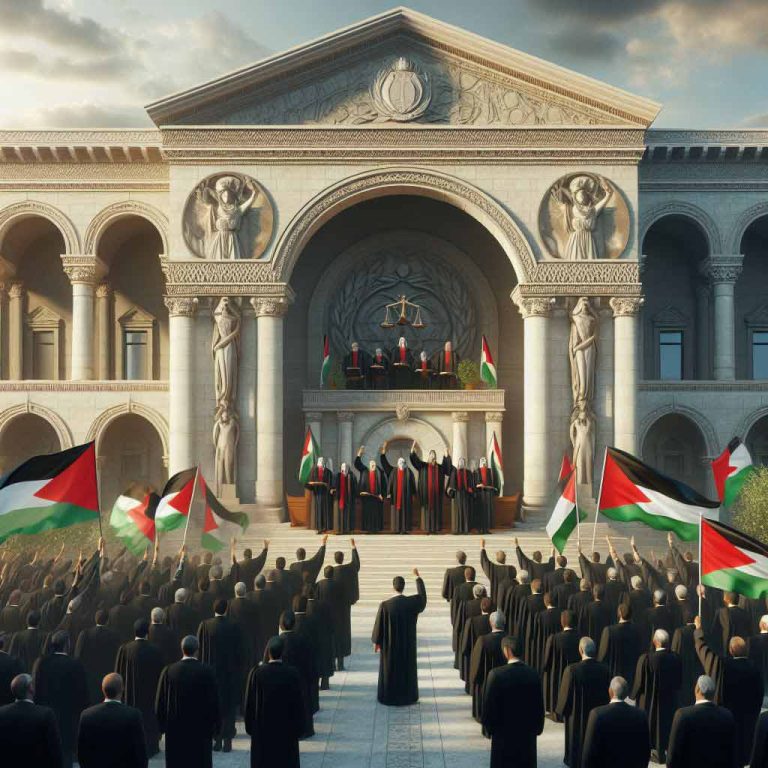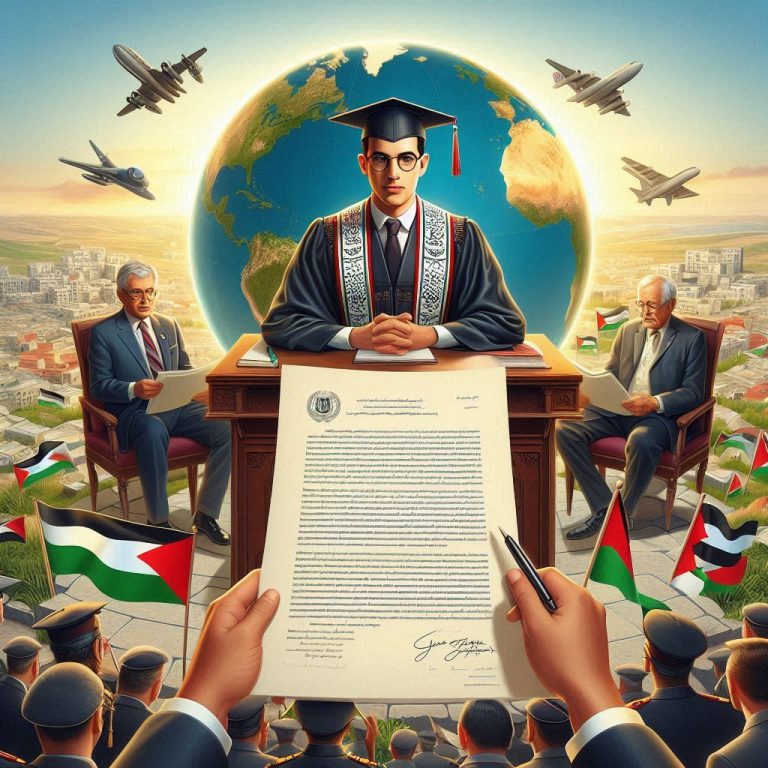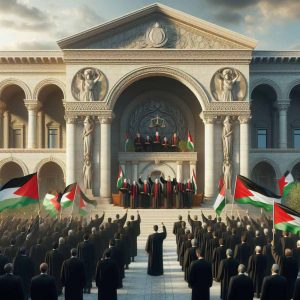Extending the Reach of International Law: Awakening Global Civil Society
Richard Falk
The Judicial Moment
In the nearly 80 years that the UN has existed, never before has such a range of law-oriented approaches in international tribunals been undertaken in attempts, so far futile, to halt the genocide that continues to ravage the lives and life circumstances of the 2.3 million Palestinian people in the Gaza Strip. Not only has the International Court of Justice (ICJ) issued Interim Orders on three occasions since January that require Israel to stop all offensive uses of force in Gaza and accompanying incitements to genocide. Additionally, Israel was ordered to stop interfering with the delivery of emergency aid to Palestinians, who continue to be victimized in various ways, including starvation and the destruction of medical facilities. In this period, as well, the Chief Prosecutor of the International Criminal Court (ICC), Karim Khan, has recommended to a Chamber of ICC judges that he be authorized to issue arrest warrants for Israeli and Hamas leaders. This upsurge in international judicial activity arises because of the frustrations at the UN over attempts to impose a ceasefire on the extremity of the conditions caused by Israeli warfare, as reinforced by the US using its right of veto in the Security Council to insulate the criminality of its young brother from UN pressures.
Israel has reacted to these developments with fury and defiance, enjoying US support more discreetly expressed. Netanyahu has repeatedly contended that in light of the Holocaust Israel can never be charged with the crime of genocide, that since October 7 Israel has been exercising its right of self-defense against a terrorist attack by Hamas, and that the proposed ICC arrest warrants if issued would undermine the ability of democracies to defend themselves in the future. He has even, with some success, called upon the US Government and other governments supportive of Israel to exert pressure on the ICC to reject the Prosecutor’s request.
In all this legal controversy, it has become significantly evident that Israel cares rather deeply about being criminally branded by these tribunals that it derides as having no competence to entertain complaints about its behavior. This double attitude deserves commentary, which suggests that Israel realizes that its refusal to comply with the rulings of these international tribunals will not erase their influence throughout civil society, making it important to maximize pressure to discourage such ICJ/ICC assessments of allegations of Israel’s criminal behavior in Gaza, especially on genocide, the crime of crimes.
The GIPRI Initiative
Against this background, the Geneva International Peace Research Institute (GIPRI) added a further dimension of legal complexity. The Rome Statute of 2002, which sets forth the treaty framework that shapes the work of the ICC, gives NGOs and individuals a right under Article 15 to bring evidence of criminality to the attention of the Prosecutor, who on his own initiative can begin an investigation to determine whether the evidence offered is sufficiently compelling to warrant an investigation. Unlike the ICJ that is concerned with resolving legal disputes between sovereign states functioning as the judicial arm of the UN, the ICC has the authority to investigate, arrest, indict, prosecute, and punish only individuals who are found by a panel of judges guilty of an international crime.
A member of the UN is automatically a party to the parallel statute governing the ICJ, while states must act affirmatively to become parties to the ICC which is formally not part of the UN, and are under no obligation to do so, although 124 states have done so, including the democracies of Western Europe and Palestine (treated as a state for this purpose). Of relevance is the fact that neither Israel nor the United States have become parties to the Rome Statute, nor has Russia, China, India, and a few others. The US, nevertheless, had no hesitancy about pushing the ICC to indict Vladimir Putin in the aftermath of Russia’s attack upon Ukraine in 2022, while opposing applicability to Israel in the Gaza situation on the grounds of its non-party status. The Rome Statute gives the ICC authority to act against individuals who commit crimes in the territory of any party to the treaty, which in this case is Palestine.
The GRIPI initiative is further intriguing because it is directed toward the relatively neglected question of complicity or aiding and abetting the commission of an international crime. This issue, based on the legal duty embedded in the Genocide Convention to prevent the crime as well to refrain from genocide itself and on Article 6, 7, 8 of the Rome Statute that criminalizes aiding and abetting crimes in violation of international humanitarian law. Nicaragua initiated such a complaint in the ICJ against Germany, seeking an Emergency Order to cease activity that could ‘plausibly’ be found to be genocide. The main allegation against Germany was that it was providing Israel with military weaponry that was instrumental to its genocidal conduct.
On April 30th ICJ rejected Nicaragua’s request by a 15-1 vote on the ground that the military support provided to Israel was too small to justify action by the Court in response to an Emergency Request. At the same time, it rejected Germany’s effort to have the Nicaragua’s complaint on complicity dismissed, which means that the ICJ will in due course hear arguments on the merits of the underlying complicity contention from both sides and eventually reach a substantive decision.
In contrast, the GIPRI initiative is put in the form of a statement delivered to the ICC prosecutor on May 22, and is endorsed by two French NGOs and a group of international law experts as individuals (including myself). The GIPRI statement charging criminality is also based on a theory of criminal complicity (associated with the Genocide Convention) and aiding and abetting (associated with the range of crimes including genocide but extending to Rome crimes involving violations of the Geneva Conventions setting forth the requirements of International Humanitarian Law).
If this format is not intriguing enough, then consider that that the person targeted is not an official or a state but the President of the European Commission (EC), Ursula von der Leyen, who is charged with both positive acts of complicity and legal omissions of her duty to act. The basis of the allegation is contained in the language of Article 25(3) that imposes criminal accountability on individuals who undertake action “(f)or the purpose of facilitating the commission of such a crime, aids, abets or otherwise assists in its commission or its attempted commission, including providing the means for its commission.”
The GIPRI Statement goes on to make specific allegations implicating Madame der Leyen leading it to conclude that “EC support of Israel has had a substantial effect on Israel’s commission and continuation of crimes, including genocide.” This support has consisted of political backing in diplomatic settings, military materials, and the failure to take reasonable steps to prevent genocide. In developing the arguments the personal expressions of solidarity with Israel by this EC official, a German national, are given emphasis to establish the point that she was not only representing the EC in these unlawful ways, but was acting on her own unlawful interpretation of relations with an ongoing genocide.
In my judgment it is highly problematic that the Prosecutor, who despite recent more assertive behavior exhibited in his recent request for arrest warrants, is known as cautious, generally pro-Western, and with a reputation when selected of a friendly attitude toward Israeli state policy, would lend credibility to such an initiative coming from a non-state source.
Whatever becomes of the GIPRI initiative it does illustrate the breadth of the ICC potential and exhibits an effort of civil society to invoke international law given the failure of the UN or the inter-governmental system to prevent and punish such a transparent genocide that has been confirmed in its intention by the statements and conduct of Israel’s political and military leaders. Along with such solidarity moves as the BDS campaign and university protests, especially in the US, civil society is showing itself to be a political actor that even Israel understands it cannot ignore if it has any hope of avoiding a long-term pariah status. However the ICC responds to this GIPRI initiative it is a further sign that civil society is becoming a political actor on the global stage.









